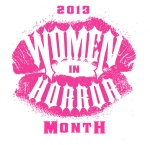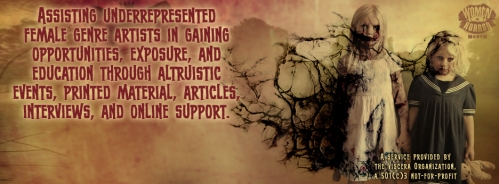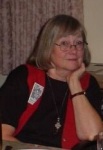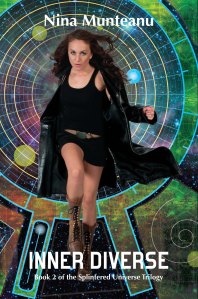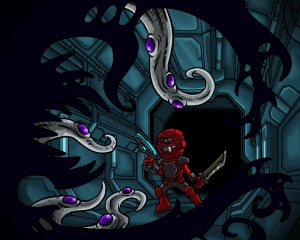Yes, today, the last day of February and Women in Horror Month, I’m interviewing myself. After all, it’s only fair to subject myself to questions I gave the other writers. But stay tuned through March as there will probably be more women in horror and even a guy or two as well. I hope to expand on the interviews with some people.
I’m a twice Aurora Award finalist in poetry, and have received several Year’s Best Fantasy & Horror (or Science Fiction) honorable mentions, as well as being shortlisted for the Gaylactic Spectrum Award, the Rannu competition, the Friends of Merril contest and the Speculative Literature Foundation. The anthology Deep Cuts with my story “Red is the Color of My True Love’s Blood” is hitting the shelves (and the virtual world) as we speak. Check out Evil Jester Press. Bibliotheca Fantastica is about to be released with “The Book With No End” from Dagan Books. Then, by April “Tower of Strength” in Irony of Survival through Zharmae Publishing, and “P is for Phartouche: The Blade” in Demonologia Biblica should also be released through Western Legends Publishing, with a poem out in Bull Spec later this year and a story in Chilling Tales 2 by fall.
COLLEEN ANDERSON
1. Why do you write dark fiction/horror? Some people consider it only a sensationalistic tableau. Why this genre over others or do you span the literary landscape?
I actually span the landscape from fantasy, SF, mainstream, poetry, erotica to horror or dark fantasy. I never did set out to write dark fiction but found even when I thought a story was just fantasy I was getting comments from magazines that they didn’t take horror. A few years ago I sold a dark tale to Evolve and one to Horror Library IV and I realized I was selling more of the dark fiction than other works. In fact, I guess I’m not as funny as I think I am because no one buys my humorous stories. I seem to be more a natural at digging into the viscera of a tale. I’ve only ever written one tale, a flash fiction piece where I set out to write something truly gruesome and horrible. In doesn’t dig much into a person’s psyche but is just a tale of terrible deeds. That’s probably why I could sustain it past 500 words.
2. What dark themes do you explore in your fiction?
I was asked this once by a fellow writer and I had no clue but in the process of compiling my reprint stories for Embers Amongst the Fallen it became clear that I do a fair number of morality tales. These aren’t overt but the protagonist may be faced with making a hard decision: honor their dying partner’s wish or take revenge, follow the rules of society or satisfy their own desires, become a monster or give compassion, etc. We make decisions every day and many aren’t life or death or defining moral character but I find it fascinating and squirmy to put characters into these dilemmas. Through them, I define myself better and hopefully get people to think.
3. Do you feel horror/dark fiction is an important genre and why; what does it bring to the table or allow you to explore? Who inspired you?
The fact that we separate tales into genre is a falsified categorization by marketing departments the world over. The dark side is inherently part of our lives. We cannot appreciate the light without the darkness to counterbalance it. This is in every tale from gods and heroes of the ancients to Luke Skywalker confronting his fallen father. If you have conflict, in some ways you always have darkness. Horror for the splatter and gore of it only isn’t that deep but some people enjoy it because of that thrill of terror that lets us know we’re alive and that our lives are better than what we’re watching.

A collection of previously published speculative fiction, available through Smashwords and Amazon.
With the more fantastical tales, it lets me take something to an extreme, to show a story and make one think and ponder the what-ifs. Sometimes there’s too much political finger pointing and the world of the fantastic lets us explore these things or say, you know it could go this way if we’re not careful. Sometimes we write cautionary tales.
As a child I loved reading the Norse myths, then those of Ireland and Greece, and fairy tales of course. Ray Bradbury, Frank Herbert, Edgar Allan Poe were probably the first to pull me onto the road of the fantastic. My older brother left a lot of his books behind, and then there were shows like The Twilight Zone and The Outer Limits, not to mention scary movies with Vincent Price and Bela Lugosi.
4. Do you feel women are under-represented in any way in the speculative arena or do you think there is more focus on them than on men? (or examples of how there is a balance)
I can see how this could be a problem in the movie industry more, and there is still a predominance in mainstream literature to believe that only if you’re a dead white male was your writing worth studying. That’s shifting both in terms of the living and the non males. I don’t think it’s much of an issue anymore as some of the best writers out there are women. Though I recall a collection being put out last year called something like the Decade’s or the Centuries Best SF. There wasn’t one woman listed and the editors were lambasted so it’s not completely equal yet. But I don’t think I’ve ever run into my stories being taken or rejected because I was a woman.
5. Abuse against women is worldwide: the gang rape of the Indian woman, women assaulted in various terrorist attacks or protests against regimes (Egypt, Syria, etc. throughout time), domestic violence and murder at the hands of boyfriends, fathers, families and husbands, sexist representation, being treated as second class citizens or possessions and made to dress in a particular way, etc. With all that’s going on, what do you want to say about where women are or what we can do to stem the tide?
I actually worry because some people feel that this is a backlash because women are getting stronger. Contrarily, I think it’s because religion is become less centralized and more dichotomized into fundamentalism. The fact that some men feel they need to fear and/or control women does not mean women are getting a better shake at things. A picture posted going around shows Mogadishu with women in front of a college in the 1960s and one in recent years. Only in the recent one is every single person veiled and covered head to toe. That’s not progress. That’s not giving equality to women but putting them back in the basket where women caused the downfall of mankind, or are vixens or seductresses. We have a very long ways to go yet.
What we can do is to not step back, not be complacent. Edmund Burke said, “The only thing necessary for the triumph of evil is for good men to do nothing.” This goes for women as well. If we pretend or think it won’t happen to us, all you have to do is look to the US and how right-wing fundamentalism is trying to take away women’s rights. It’s partly why dark fiction lends us a canvas where we can paint something as simplistic as a revenge fantasy but we can also show the strength of women and that all people of any gender can be good or evil. We have to continue to speak against this or one day even women will believe they shouldn’t have the right to vote because they should be in the kitchen serving the power of their man. And it makes me sad that some women have no opinion about this. Really?
6. Lastly, this is your space to add anything else you would want to say.
I have several pieces eligible to be nominated in this year’s Aurora Awards in which Canadians can nominate and vote.
I have three stories:
- “The Brown Woman” in Over the Brink
- “Shoes” published in my collection, Embers Amongst the Fallen
- “What Strange Fruit” in my collection, Embers Amongst the Fallen
The collections is also eligible as well.
There are three poems:
- Mermaid (a villanelle) up at Polu Texn
- Legend in Heroic Fantasy Quarterly
- Queen of Heaven and Earth at Eternal Haunted Summer
THE MISSION
Women in Horror Recognition Month (WiHM) assists underrepresented female genre artists in gaining opportunities, exposure, and education through altruistic events, printed material, articles, interviews, and online support. WiHM seeks to expose and break down social constructs and miscommunication between female professionals while simultaneously educating the public about discrimination and how they can assist the female gender in reaching equality.
THE VISION
A world wherein all individuals are equally given the opportunity to create, share, and exploit their concept of life, pain, and freedom of expression.

